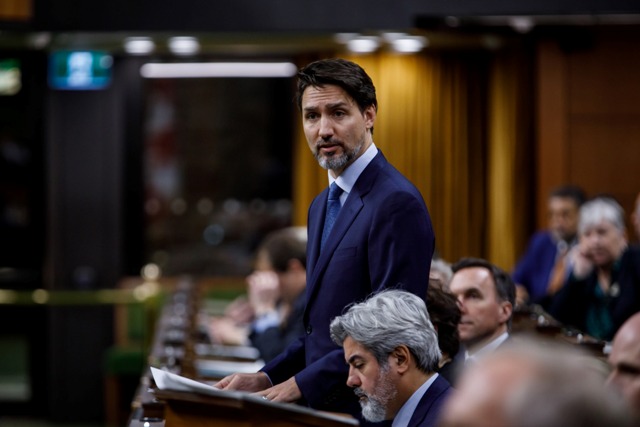 President Trudeau speaking in parliament in February 2020. [Photo: Prime Minister's Facebook post]
President Trudeau speaking in parliament in February 2020. [Photo: Prime Minister's Facebook post]
[This is an excerpt from an opinion piece in The Round Table; The Commonwealth Journal of International Affairs.]
Provincial governments in both Alberta and Saskatchewan increased their pressure on Mr Trudeau in November 2019, arguing that the time had come for a revision of the federal equalisation programme, a key mechanism by which Ottawa adjusts allocations of taxation to ensure approximate levels of social equity across Canada, despite disparate provincial tax regimes. In the weeks following the election, Mr Trudeau visited each of the Western premiers, seeking their counsel and hoping to better understand the renewed dynamics of Western alienation. Trudeau’s December agreement with Alberta over a more relaxed approach to carbon taxes sets the stage for further negotiation of regional interests.
This renewed attention to ‘national unity’ hearkens back to the 1980s and early 1990s in Canada and the tensions around Western energy resources, Quebec nationalism, and the constitutional debates captured in the Meech Lake Accord.
New cabinet appointments reflect these rising regional tensions. Several Quebec MPs are now around the table in key portfolios, including foreign affairs; the former minister of trade diversification has been given special responsibility as a broker for the West while new deputy prime minister Chrystia Freeland (born in Alberta of Ukrainian descent) takes responsibility for intergovernmental affairs – with a focus on the West and the hope of the similar success that she had in renegotiating a renewed North American free trade agreement between Canada, the United States and Mexico.
Regional tensions in the Canadian federation have international impacts. Control over Western energy resources (particularly where royalties and profits accrue) has implications for Canada’s relationship with the United States, China and other countries. Similarly, western Canadian agriculture is being damaged by China’s restrictions on imports of canola, soybeans and beef. Unless Ottawa makes significant progress with China on its current diplomatic challenge over the potential extradition of Huawei executive Meng Wanzhou to the United States, Western alienation will strengthen. In Atlantic Canada, lucrative seafood, blueberry and wine exports to China have so far escaped damage but the pressure is building on the region’s provincial governments to consider carefully their trade partnerships with China. Caught between the views of the White House and a growing public concern over the detention of Canadians, human rights, and cyber-security issues, the Liberal government’s relationship with China is of paramount importance – all at a time when China is asserting itself in global politics, trade and influence.
Additionally, fractures in international multilateralism in 2019 mean that Canada is engaging more strongly in bilateral relationships, not only with the United States and China but with India, the United Kingdom and Australia. There are challenges and opportunities here for Canada’s participation in the Commonwealth, NATO and the Trans-Pacific Partnership trade agreement, in addition to its relationships with the European Union and individual members – many of whom are engaging in carefully cultivated bilateral talks and connections. In sum, the new Trudeau government will seek a balance between strengthened domestic regional tensions and a compounding destabilisation of long-time international multilateral relationships.
Robert Summerby-Murray is with Saint Mary’s University, Halifax, Nova Scotia, Canada.



